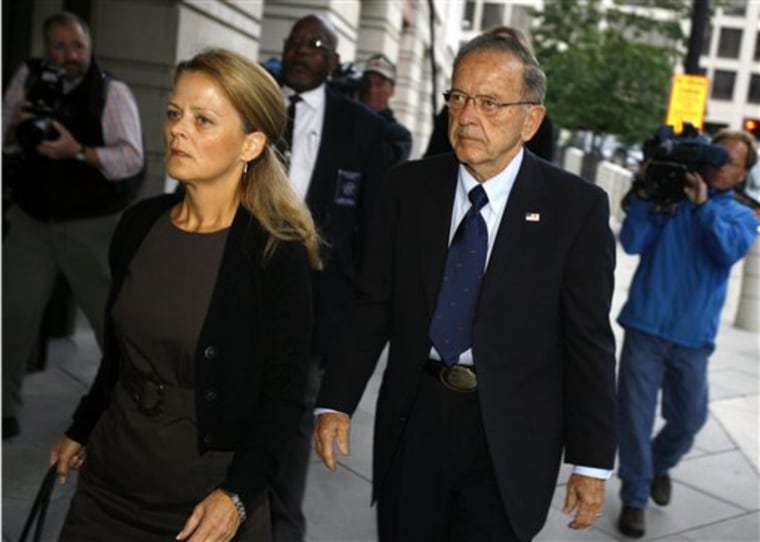Sen. Ted Stevens was clueless about the cost and scope of a pricey remodel of his Alaska house that led to federal corruption charges and threatened his lengthy career, his lawyer said Thursday at the opening of his trial.
Federal prosecutors allege that Stevens — one of Congress' most powerful Republicans and a patriarch of Alaska politics for generations — lied on Senate forms about more than $250,000 in home renovations and gifts from a wealthy oil contractor and close friend, Bill Allen, who expected political favors in return.
But defense attorney Brendan Sullivan, in making the first public defense of the 84-year-old senator, shifted blame to Allen and responsibility to Stevens' wife, Catherine.
"You cannot report what you don't know," Sullivan said. "You can't fill out a form and say what's been kept from you by the deviousness of someone like Bill Allen."
Sullivan said the senator's wife handled all the project's finances and was the driving force behind the renovations. When Stevens had a message for her, he communicated through his Senate staffers.
"They have a saying in their house that when it comes to things in and around the teepee, the wife controls," Sullivan said.
GOP liability?
A longtime Senate powerhouse — Stevens is famous, and to his opponents, infamous — for steering billions of dollars to his home state. But the case has turned him into such a political liability that the Republican vice presidential nominee, Alaska Gov. Sarah Palin, has refused to endorse him in his unusually tight re-election race.
"Ted Stevens' trial started a couple of days ago," Palin said Thursday. "We'll see where that goes."
The Senate's longest-serving Republican sat grim-faced at the defense table in a packed courtroom as prosecutor Brenda Morris dismissed the theory that he was oblivious to what went on around him.
Morris portrayed Stevens as a crafty politician whose decades in office schooled him in the art of cultivating cronies and concealing gifts and favors.
"You do not survive politics in this town for that long without being very, very smart, very, very deliberate, very forceful and, at the same time, knowing how to fly under the radar," Morris said in her opening statement.
At the heart of the case is a complicated 2000 home remodeling project in which Stevens' small chalet in the woods outside Anchorage was jacked up on stilts and a new first-floor was built. Rather than hiring a home contractor, Stevens relied on Allen, the chairman of oil services firm VECO Corp., to manage the project, hire the carpenters and review the bills.
Prosecutors say Stevens never paid Allen or VECO employees for their services, part of a long pattern of freebies he is accused of concealing. Allen gave Stevens a gas grill, a generator, an elaborate rope lighting system and a sweetheart deal on a car.
"We reach for the yellow pages, he reached for VECO," Morris said, "and the defendant never paid a dime."
Sullivan countered that Stevens' wife promptly paid every bill received — $160,00 in all — for the home project that was to make room for visits by his 11 grandchildren. He described Allen regularly going overboard with his giving, and at one point pressuring a local contractor to "eat" a $19,000 bill rather than send it to Stevens.
A potential witness in the case, Catherine Stevens was not in court Thursday.
Quid pro quo?
Just as Stevens relied on Allen for favors, prosecutors say Allen tapped the senator for help winning government grants and navigating Washington's bureaucracy. Citing Stevens' reputation for steering money and business to Alaska, Sullivan embraced the suggestion.
"If you hear evidence that he assisted Bill Allen or VECO in any way so those 4,000 employees could continue to work, they're right," Sullivan said. "There's absolutely nothing wrong with it. He's proud of it. Bring it on."
As for the grill, rope lighting and other unreported gifts including a sled dog, Sullivan said Stevens "didn't want these things, he didn't need these things and he didn't ask for these things."
The lawyer also cited e-mails he claimed would show that the senator had no intent to deceive the public. One to Allen read in part: "Thanks for the work. You owe me a bill."
The trial's first witness, a VECO project manager who met with Stevens about the home project and prepared the plans, testified that he received a note from the senator saying, "Under Senate rules, I must pay you for what you've done."
The manager testified that he instructed Stevens to pay VECO. But prosecutors say the senator never covered the $3,000 job.
Another VECO worker testified that he was dispatched by Allen to the Stevens cabin to shovel snow and install a $6,000 backup generator while the senator was away. On cross-examination, he said his boss was "very generous" with many people.
Allen has pleaded guilty to bribing Alaska lawmakers and is the government's star witness against Stevens. He is expected to testify soon.
